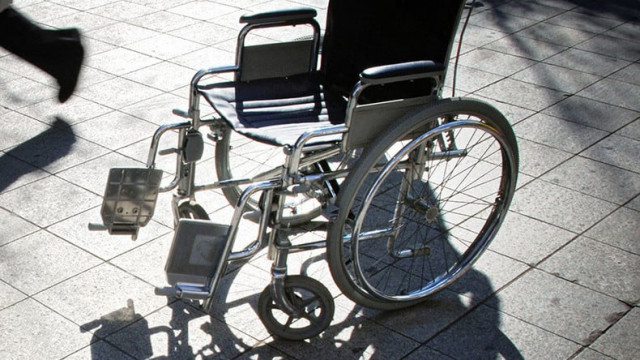Media’s portrayal of persons with disabilities locked between pity and heroism
People with disabilities are just another variety of people, says panelist

PHOTO: REUTERS
This was stated by Yumna Ikram at a seminar, 'Media and Disability: Pity-heroism and Dichotomy,' organised by NOWPDP, in collaboration with Institute of Business Administration, to commemorate the International Day of Persons with Disabilities. Ikram, who is visually-impaired, currently works as a computer trainer.
Another panellist, Amna Raheel, said that the media portrays persons with disabilities using three lenses. They think that they are either seeking attention, are helpless and pity them or they portray them as heroes. Sharing her personal experience on the Internet, she said that previously she wasn't as self-confident and did not post pictures of herself in a wheelchair on Facebook, but slowly she came out of her shell. After she got her degree and started working, she also made appearances on TV channels to raise awareness on the issue. When she began her blog and posted her thoughts on social media, she was surprised to find that people thought she was simply seeking attention. She said that this was one of the reasons why people with disabilities do not talk about their struggles and added that one should refrain from trivialising the issue.
Ikram concurred. "We are not helpless and we do not want looks of pity," she said, adding that all she wanted was to be treated equally.
Ali Gul Pir, a rapper and comedian, said that in the media, when they want to hire a person with disability, their character was written that way. Citing the example of Omer Sharif's plays, he said that every play features a short man. His role is that of a security guard which people find funny, and throughout the play he gets slapped by other characters. "This type of mentality needs to change," said Pir. He stressed the need to shed such stereotypes and respect others.
Zarrar Khuhro, a journalist, said that the media industry was evolving and there is a better representation and understanding of the issue in movies and shows. He quoted the examples of television series such as Udaari that talked about child sexual abuse and Taare Zameen Par, that shared the struggle of a dyslexic child. He added that the coverage of Yousuf Saleem's right to practice law was another good example.
Saleem, a visually impaired law student who graduated with a gold medal, aced his exams but when he wanted to practice, he was asked how he could become a judge when he couldn't even read the judgment. Khuhro said that the news coverage that he received was one that focused on his merit, not one that sought to show him as someone helpless. He said talking about issues in such a way was a breakaway from the way media usually portrayed people with disabilities.
Khuhro did admit, however, that the media had a role in creating perceptions and spreading awareness and to illustrate this, he said that the media was able to give this message to the Chief Justice of Pakistan who then took notice of the issue and intervened.
Munim Kazi, who is hearing-impaired, graduated from IVS and is a fashion designer. Getting into IVS was a struggle on its own but he proved his skills and the institute gave him a chance. When he went to interview for a job, he did not share his disability on his CV and instead asked them to take his written test. He said that it was simply about getting the chance, and the persons with disability would prove themselves.
Ikram said that people with disabilities were often perceived as heroes. The logic is that when a person is deprived of one ability, the human body compensates for it by improving other abilities. As Khuhro pointed out, it does not make one a daredevil.
Ikram criticised the portrayal of persons of disabilities in the movie Kaabil - the story of a visually-impaired couple. The story shows that the wife is raped which sends the message that two visually impaired people cannot be married. Then the movie shows that the hero avenges the wrong by tracing the villains by smelling their socks and then killing them. "This does not happen," she said. She argued that a better option would have been to show him using technology to exact his revenge rather than create unrealistic expectations. She said that they were like just any other person and such portrayal takes away from them.
Published in The Express Tribune, December 4th, 2018.


















COMMENTS
Comments are moderated and generally will be posted if they are on-topic and not abusive.
For more information, please see our Comments FAQ